
Timothy Havens (CC/ICC) was quoted in the article “Artificial Intelligence (AI): 9 things IT pros wish the CIO knew,” posted October 20, 2020, on The Enterprisers Project website.
Link to the article here.

Timothy Havens (CC/ICC) was quoted in the article “Artificial Intelligence (AI): 9 things IT pros wish the CIO knew,” posted October 20, 2020, on The Enterprisers Project website.
Link to the article here.
ECE Doctoral Defense Tomorrow
Computer Engineering doctoral candidate Zhiqiang Zhao will defend at 4 p.m. tomorrow (Oct. 23) via Zoom.
The title of his presentation is “High-Performance Spectral Methods for Computer-Aided Design of Integrated Circuits.”
Co-advisors are Zhuo Feng (ECE) and Glen Archer (ECE).
Be Innovative. Be Active. Be Effective. This is College of Computing Assistant Professor Sidike Paheding’s teaching philosophy.
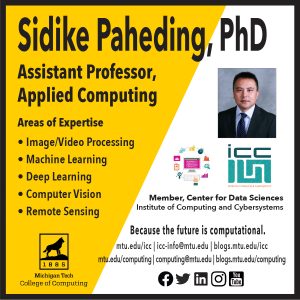
New to the Department of Applied Computing this fall, Paheding’s teaching interests include digital image processing and machine learning. This academic year he is teaching SAT3812 Cyber Security I.
A member of the Institute of Computing and Cybersystems’s Center for Data Sciences, Paheding’s research seeks to develop novel AI-driven technologies. His primary interests are image/video processing, machine learning, deep learning, computer vision, and remote sensing.
Paheding comes to Michigan Tech from Purdue University Northwest, where he was a visiting assistant professor in the ECE department. Prior to that, he was a postdoctoral research associate and assistant research professor in the Remote Sensing Lab at Saint Louis University from 2017 to 2019.
Paheding is an associate editor of the journals, Signal Image and Video Processing (Springer) and Photogrammetric Engineering and Remote Sensing (ASPRS), and topic editor for Remote Sensing. He completed his Ph.D. in electrical engineering at University of Dayton, Ohio.
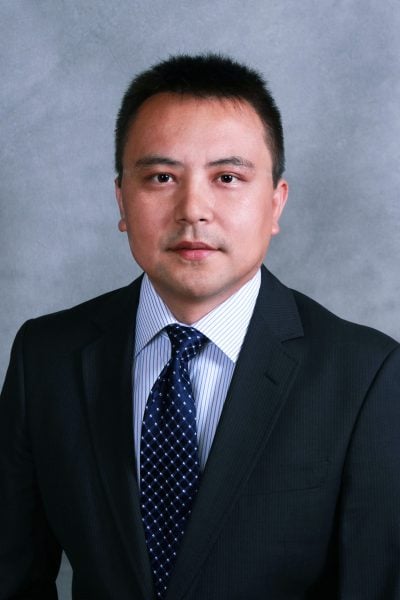
Computing is a part of my life.
Sidike Paheding, Assistant Professor, Applied Computing
Title: Cybersecurity Modules Aligned with Undergraduate Computer Science and Engineering Curricula
Sponsor: NSF
PI at Michigan Tech
Duration: July 2020 – June 2022
Total Award: $159,417.00
This project aims to serve the national interest by improving how cybersecurity concepts are taught in undergraduate computing curricula. The need to design and maintain cyber-secure computing systems is increasingly important. As a result, the future technology workforce must be trained to have a security mindset, so that they consider cybersecurity during rather than after system design.
This project aims to achieve this goal by building plug-and-play, hands-on cybersecurity modules for core courses in Computer Engineering, and Computer Science and Engineering. The modules will align with the curricula recommended by the Association for Computing Machinery and will be designed for easy adoption into computing programs nationwide. Modules will be designed for integration into both introductory and advanced courses, thus helping students develop in-depth understanding of cybersecurity as they progress through their computing curriculum. It is expected that the project will encourage more students to pursue careers or higher degrees in the field of cybersecurity.
Sidike, P., Sagan, V., Maimaitijiang, M., Maimaitiyiming, M., Shakoor, N., Burken, J., … & Fritschi, F. B. (2019). dPEN: deep Progressively Expanded Neural Network for mapping heterogeneous agricultural landscape using WorldView-3 satellite imagery. Remote Sensing of Environment, 221, 756-772. [Impact Factor: 9.085]
Sidike, P., Asari, V. K., & Sagan, V. (2018). Progressively Expanded Neural Network (PEN Net) for hyperspectral image classification: A new neural network paradigm for remote sensing image analysis. ISPRS journal of photogrammetry and remote sensing, 146, 161-181. [Impact Factor: 7.319]
Sidike, P., Asari, V. K., & Alam, M. S. (2015). Multiclass object detection with single query in hyperspectral imagery using class-associative spectral fringe-adjusted joint transform correlation. IEEE Transactions on Geoscience and Remote Sensing, 54(2), 1196-1208. [Impact Factor: 5.855]
Maimaitijiang, M., Sagan, V., Sidike, P., Hartling, S., Esposito, F., & Fritschi, F. B. (2020). Soybean yield prediction from UAV using multimodal data fusion and deep learning. Remote Sensing of Environment, 237, 111599. [Impact Factor: 9.085]
Are you thinking about attending graduate school? Are you open to learning about emerging career areas in which you can leverage your undergraduate learning in healthcare or computer science?

On Tuesday, October 27, 2020, at 6:00 p.m., via online Zoom meeting, the Health Informatics Master of Science and Accelerated Master’s programs will present a virtual info session for current students.
Please pre-register for the free info session here.
From the general to the specific, the info session will cover what you need to know about applying for and completing a Health Informatics master’s degree at Michigan Tech.
Attendees will consider the benefits of an advanced degree, learn about the fast-track accelerated master’s program, review the the online application process, and more.
Associate Professor Guy Hembroff, Health Informatics graduate program director, and Jacque Smith, director of Enrollment Services for the Michigan Tech Graduate School, will host the info session.
A link to the virtual info session will be shared shortly.
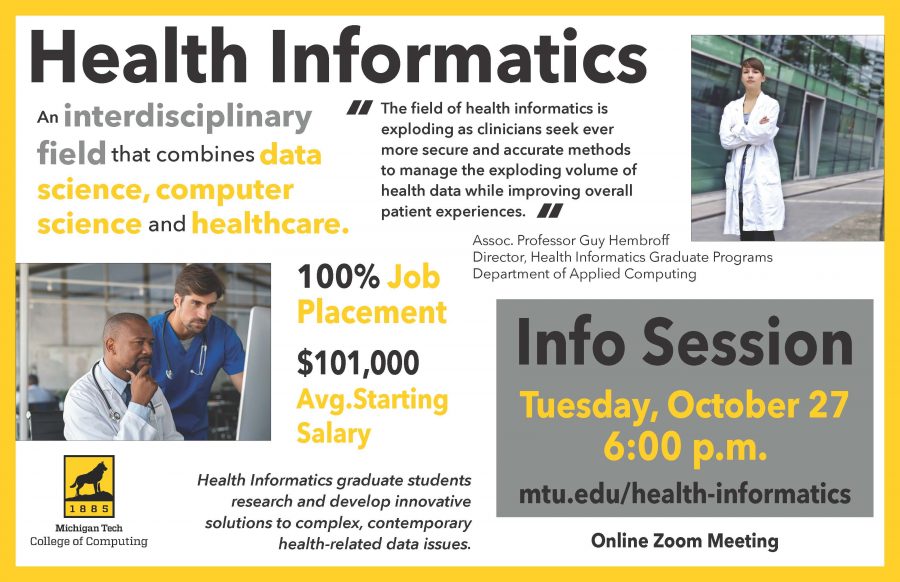
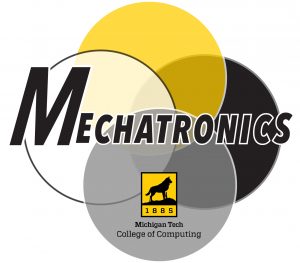
Michigan Tech recently launched a year-long Career and Technical Education (CTE) program for high school juniors or seniors in the area of Mechatronics. The new CTE Mechatronics program is offered through a partnership between Michigan Tech and the Copper Country Intermediate School District (CCISD).
Teaming up to deliver the instruction are faculty in the Mechatronics, Electrical and Robotics Engineering Technology (MERET) program in the College of Computing, and faculty in the Manufacturing and Mechanical Engineering Technology (MMET) Department in the College of Engineering.
Michigan Tech faculty administering the CTE program include Prof. John Irwin, Chair of the Department of Manufacturing and Mechanical Engineering Technology, or Prof. Alex Sergeyev in the College of Computing.
“Students in the program will find careers in smart manufacturing fields, or they can find a pathway at Michigan Tech into undergraduate or graduate degrees in Engineering Technology, Engineering, or Mechatronics.” says Irwin.
There are 10 students enrolled this fall 2020 from the local area school districts of Houghton, Hancock, Calumet, and L’Anse. CTE Director Shawn Kolbus expects the program to only increase in popularity. “Local business owners approached us last year wanting to get more students from the area interested in Mechatronics, CADD and Engineering,” he says. “The result was the Mechatronics program which encompasses standards from each area.”
The course is taught by two mechatronics professionals who possess both industry and teaching experience. One of those instructors is George Ochieze, who is pursuing a master’s degree in Mechatronics and a PhD in Mechanical Engineering at Michigan Tech. “Even in difficult times during the pandemic, these young scholars show overwhelming potential to conquer the mechatronics field—a glimpse into a welcoming future in engineering,” says Ochieze.
The second instructor, Chinmay Kondekar, will earn an MS in Electrical Engineering at Michigan Tech in 2021. “Teaching for local schools is an opportunity for me to give back to people in the community who welcomed me as an international student,” says Kondekar. “I hope to create a strong interest in robotics and automation in my students. People with these skills will be the future of manufacturing and will have plenty of opportunities.”
Program enrollment is closed for 2020, but will be available again starting in fall 2021. This spring there will be the opportunity for area sophomore and junior students to visit Michigan Tech to tour the labs and meet the instructors. Both the Applied Computing and MMET department labs used at Michigan Tech are equipped with state-of-the-art electronics and mechanical systems partially provided through generous startup funding from the CCISD.
Mechatronics uses electromechanical systems, typically automated for the design of products and processes. Industry 4.0—sometimes called the “fourth industrial revolution”—applies various aspects of mechatronics to manufacturing enterprises. Topics in the CTE Mechatronics program include; automation, computer integrated manufacturing, high speed manufacturing, embedded systems design and controls, industrial robotics, pneumatics, hydraulics, and computer-aided design.
For more information please contact Shawn Kolbus, Director, Career and Technical Education, Copper Country Intermediate School District (906) 250-5353.
What are you doing for supper this Monday night at 6? Grab a bite with Dean Janet Callahan and Associate Professor Tim Havens, director of the Michigan Tech’s Institute of Computing and Cybersystems and associate dean for research in the College of Computing. Get the full scoop and register at mtu.edu/huskybites.
“Nearly everyone has heard the term ‘Deep Learning’ at this point, whether to describe the latest artificial intelligence feat like AlphaGo, autonomous cars, facial recognition, or numerous other latest-and-greatest gadgets and gizmos,” says Havens. “But what is Deep Learning? How does it work? What can it really do—and how are Michigan Tech students advancing the state-of-the-art?”
In this session of Husky Bites, Prof. Havens will talk about everyday uses of machine learning—including the machine learning research going on in his lab: explosive hazards detection, under-ice acoustics detection and classification, social network analysis, connected vehicle distributed sensing, and other stuff.
Joining in will be one of Havens’ former students, Hanieh Deilamsalehy, who earned her PhD in electrical engineering at Michigan Tech. She’s now a machine learning researcher at Adobe. Dr. Deilamsalehy graduated from Michigan Tech in 2017 and headed to Palo Alto to work for Ford as an autonomous vehicle researcher. She left the Bay Area for Seattle to take a job at Microsoft, first as a software engineer, and then as a machine learning scientist. In April she accepted a new machine learning position at Adobe, “in the middle of the pandemic!”
Havens is a Michigan Tech alum, too. He earned his BS in ‘99 and MS in Electrical Engineering in ‘00, then went to the MIT Lincoln Laboratory, where he worked on simulation and modeling of the Airborne Laser System, among other defense-related projects. From there it was the University of Missouri for a PhD in Electrical and Computer Engineering, researching machine learning in ontologies and relational data.
Nowadays, Havens is the William and Gloria Jackson Associate Professor and Associate Dean for Research in the College of Computing. In addition to serving as director of Michigan Tech’s ICC, he also heads up the ICC Center for Data Sciences and runs his own PRIME Lab, too (short for Pattern Recognition and Intelligent Machines Engineering).
“An important goal for many mobile platforms—terrestrial, aquatic, or airborne—is reliable, accurate, and on-time sensing of the world around them.”Tim Havens
Havens has spent the past 12 years developing methods to find explosive hazards, working with the US Army and a research team in his lab. According to a United Nations report, more than 10,000 civilians were killed or injured in armed conflict in Afghanistan in 2019, with improvised explosive devices used in 42 percent of the casualties. Havens is working to help reduce the numbers.
“Our algorithms detect and locate explosive hazards using two different systems: a vehicle-mounted multi-band ground-penetrating radar system and a handheld multimodal sensor system,” Havens explains. “Each of these systems employs multiple sensors, including different frequencies of ground penetrating radar, magnetometers and visible-spectrum cameras. We’ve created methods of integrating the sensor information to automatically find the explosive hazards.”
As a PhD student at Michigan Tech, Deilamsalehy worked alongside Havens as a research assistant in the ECE department’s Intelligent Robotics Lab (IRLab). “My research was focused on sensor fusion, machine learning and computer vision, fusing the data from IMU, LiDAR, and a vision camera for 3D localization and mapping purposes,” she says. “I used data from a sensor platform in the IRLab, mounted on an unmanned aerial vehicle (UAV), to evaluate my proposed fusion algorithm.”
Havens is also co-advisor to students in the SENSE (Strategic Education through Naval Systems Experience) Enterprise team at Michigan Tech, along with ME-EM Professor Andrew Barnard. Students in SENSE design, build, and test engineering systems in all domains: space, air, land, sea, and undersea. Like all Enterprise teams, SENSE is open to students in any major.
I first became an engineer at Michigan Tech in the late 90s. What really sparked my interest in what-I-do-now was my introductory signal processing courses. The material in these courses was the first stuff that really ‘spoke’ to me. I have always been a serious musician and the mathematics of waves and filters was so intuitive because of my music knowledge. I loved that this field of study joined together the two things that I really loved: music and math. And I’ve always been a computer geek. I was doing programming work in high school to make extra money; so that side of me has always led me to want to solve problems with computers.
I grew up in Traverse City, Michigan, and came to Tech as a student in the late 90s. I’ve always wanted to come back to the Copper Country; so, it’s great that I was able to return to the institution that gave me the jump start in my career. I live (and currently work from home) in Hancock with my partner, Dr. Stephanie Carpenter (an author and MTU professor), and our two fur children, Rick Slade, the cutest ginger in the entire world, and Jaco, the smartest cat in the entire world. I have a grown son, Sage, who enjoys a fast-paced life in Traverse City. Steph and I enjoy exploring the greater Keweenaw and long discussions about reality television, and I enjoy playing music with all the local talent, fishing (though catching is a challenge), and gradually working through the lumber pile in my garage.
I was born and raised in Tehran, Iran. I have always been into robotics. I was a member of our robotics team in high school and that led me to engineering. I decided to apply to Michigan Tech sort of by chance when a friend of mine told me about it. I looked at the programs in the ECE department, and felt they aligned with my interests. Then soon after I first learned about Michigan Tech, I found out that one of my undergraduate classmates went there. I talked to him, and he also encouraged me to apply. And that’s how I was able to join Michigan Tech for my PhD program. My degree is in electrical engineering but my focus at Michigan Tech involved computer science and designing Machine Learning solutions.
I now live in Seattle, famous for outdoor activities—kind of like the UP, but without the cold—so I do lots of mountaineering, biking, rock climbing, and in the winter, skiing. I learned how to ski at Michigan Tech, up on Mont Ripley. It’s steep, and it’s cold! Once you learn skiing on Ripley, you’re good. You can ski just about anywhere.
3
By Karen S. Johnson, Communications Director, Institute of Computing and Cybersystems

Associate Professor Chee-Wooi Ten, Electrical and Computer Engineering, recently finalized contracts to write two books for CRC Press, a major publisher of humanities, social science, and STEM books and textbooks. Ten is a member of the Institute of Computing and Cybersystems’s Center for Cyber-Physical Systems.
The first book is titled, Electric Power Distribution System Engineering, 4th edition. Ten has been teaching EE5250 Distribution Engineering I at Michigan Tech for 10 years.
The second book, Modern Power System Analysis, 3rd Edition, is used to accompany a senior-level power engineering elective. Both books are tentatively scheduled to be published in January 2022.
The new editions continue the work of the late Professor Turan Gönen, a leading expert and popular professor of electrical engineering at California State University, Sacramento. Gönen devoted his life to the writing of four textbooks. One of them, “Electric Power Distribution System Engineering,” published in 2013, is still taught in college classrooms worldwide. Ten notes that it is one of only a few Distribution Engineering textbooks that remains highly regarded by the international research community.
Book contract negotiations were initiated by Nora Konopka, editorial director of engineering at CRC Press/Taylor & Francis. Konopka worked with Ten on a previous book published by the company.
And although Ten did not personally know Prof. Gönen, he has used Gönen’s books in his courses. Ten says he believes Konopka contacted him because she has confidence that he will do an excellent job in carrying on Gönen ‘s work and legacy.
“As a course instructor, especially when you’ve just started, you explore the textbook and master the materials while teaching,” Ten reflects. “Written and revised throughout his long career, the contents of Gönen’s books are enriched from his decades of experience in pedagogy.”
Konopka’s original proposal was for Ten to write four new editions of books by Prof. Gönen. Ten told her, “I cannot do four books, but I can find two other authors who have the expertise to complete those books.”
So, with collaborators at University of Hong Kong and Virginia Tech, all four books will be completed and published. Two of them written by Ten, one each by his collaborators.

“My colleagues on this project are research-active faculty, and I am very proud to have an opportunity to collaborate with them,” Ten says, noting that they represent two of the best engineering programs in the world.
“These books are collaborative, and we will work together to ensure the next editions of these textbooks reflect today’s industrial and academic knowledge and best practices,” Ten says.
But there are challenges associated with this kind of project. Ten explains that the book materials he has inherited, which are in Microsoft Word, must be converted to the typesetting format he prefers, LaTeX. Only then can he begin editing the books. Fortunately, Ten was able to hire a few students; he expects them to complete the conversions by year-end.
“Then, for the next year, I can focus on qualitative development of the content,” Ten predicts. “I plan to ‘test drive’ some of the new content in the power engineering courses I have been teaching.”
Read an obituary of Prof. Turan Gönen here.
CRC Press. is an imprint of Taylor & Francis Group, part of Informa PLC, one of the world’s leading business intelligence and academic publishing businesses. The company publishes more than 2,700 journals and 5,000 new books each year. CRC Press specializes in Science, Technology and Medical books.

Founded in 2015, the Institute of Computing and Cybersystems (ICC) promotes collaborative, cross-disciplinary research and learning experiences in the areas of computing education, cyber-physical systems, cybersecurity, data sciences, human-centered computing, and scalable architectures and systems, for the benefit of Michigan Technological University and society at large.
The ICC creates and supports an arena in which faculty and students work collaboratively across organizational boundaries in an environment that mirrors contemporary technological innovation. The ICC’s 55+ members working in six research centers represent more than 20 academic disciplines at Michigan Tech. Member scientists are collaborating to conduct impactful research, make valuable contributions in the field of computing, and solve problems of critical national importance.
Full Citations
Turan Gönen, Chee-Wooi Ten**, and Ali Mehrizi-Sani, “Electric Power Distribution System Engineering,” 4th Edition CRC, January 2022 (tentatively).
Turan Gönen, Chee-Wooi Ten**, and Yunhe Hou, “Modern Power System Analysis,” 3rd Edition, CRC, January 2022 (tentatively).
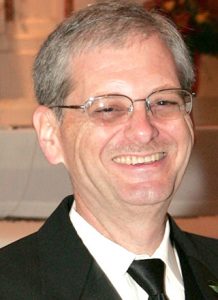
Dr. James Keller, recently retired Curators’ Distinguished Professor in the EE/CS department at University of Missouri, Columbia, will present his lecture, “Soft Streaming Classification,” on Friday, October 30, 2020, at 3:00 p.m., via Zoom online meeting.
The talk is an Institute of Computing and Cybersystems’ (ICC) Distinguished Lecture Series event.
Join the meeting here.
A Life Fellow of the Institute of Electrical and Electronics Engineers (IEEE), Keller recently received the IEEE Frank Rosenblatt Award for his “fundamental work on fuzzy pattern recognition, fuzzy clustering, and fuzzy technologies in computer vision.” He holds a number of additional professional and academic honors and awards.
Lecture Abstract
As the volume and variety of temporally acquired data continues to grow, increased attention is being paid to streaming analysis of that data. Think of a drone flying over unknown terrain looking for specific objects which may present differently in different environments. Understanding the evolving environments is a critical component of a recognition system.
With the explosion of ubiquitous continuous sensing (something Lotfi Zadeh predicted as one of the pillars of Recognition Technology in the late 1990s), this on-line streaming analysis is normally cast as a clustering problem. However, examining most streaming clustering algorithms leads to the understanding that they are actually incremental classification models.
These approaches model existing and newly discovered structures via summary information that we call footprints. Incoming data is routinely assigned crisp labels (into one of the structures) and that structure’s footprints are incrementally updated; the data is not saved for iterative assignments.
The three underlying tenets of static clustering:
These questions do not directly apply to the streaming case. What takes their place in this new frontier?
In this talk, I will provide some thoughts on what questions can substitute for the Big 3, but then focus on a new approach to streaming classification, directly acknowledging the real identity of this enterprise. Because the goal is truly classification, there is no reason that these assignments need to be crisp.
With my friends, I propose a new streaming classification algorithm, called StreamSoNG, that uses Neural Gas prototypes as footprints and produces a possibilistic label vector (typicalities) for each incoming vector. These typicalities are generated by a modified possibilistic k-nearest neighbor algorithm.
Our method is inspired by, and uses components of, a method that we introduced under the nomenclature of streaming clustering to discover underlying structures as they evolve. I will describe the various ingredients of StreamSoNG and demonstrate the resulting algorithm on synthetic and real datasets.
David Watkins (CEE/SFI) is the principal investigator on a project that has received a $190,764 research and development grant from the National Science Foundation (NSF).
The project is titled “RAPID: COVID-19, Consumption, and Multi-dimensional Analysis of Risk (C-CAR)“. Chelsea Schelly (SS/SFI), Robert Handler (ChE/SFI) and Charles Wallace (CS/SFI) are co-PIs on this one-year project.
Extract
The COVID-19 pandemic has transformed household dynamics and dramatically changed food, energy, and water consumption within the home. Stay-at-home orders and social distancing has caused U.S. households to shift to working and schooling from home, curtail outside activities, and stop eating in restaurants. Furthermore, as many households face job loss and increasing home utility and grocery bills, U.S. residents are experiencing the economic impacts of the crisis, while at the same time assessing and responding to health risks. The project team has a unique opportunity to study these shifting household consumption and behavioral responses and quantify the associated economic and environmental impacts. The team will collect household food, energy, and water consumption data as well as survey response data from 180 participating households in one Midwestern county and compare it to data collected before the stay-at-home orders were put in place.